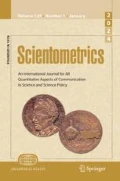Abstract
As an emerging bibliographic database, Scopus is increasingly used in academic research and evaluation practice. Compared with Web of Science, its data quality/reliability is still relatively underexplored. By using the author’s twenty-six English papers published during 2014 and 2019, this case study probes the accuracy of funding information in Scopus and shows that the accuracy of funding information collected by Web of Science is better than that of Scopus. Some obvious errors in funding acknowledgement text and funding agency fields still exist in Scopus. Therefore, Scopus needs to optimize the funding acknowledgement text identification method and improve the funding agency extraction and standardization strategy.




Notes
This study finds that Scopus updates its data frequently. For example, when the author retrieved the funding information for article #21 on 11th March, 2020, all of the funding information was correct. However, when the author rechecked the data 1 day later, some funding agency information disappeared. To be consistent, this study only keeps all the data retrieved on 11th March for analysis.
References
Álvarez-Bornstein, B., Morillo, F., & Bordons, M. (2017). Funding acknowledgments in the Web of Science: Completeness and accuracy of collected data. Scientometrics,112(3), 1793–1812.
Baas, J., Schotten, M., Plume, A., Côté, G., & Karimi, R. (2020). Scopus as a curated, high-quality bibliometric data source for academic research in quantitative science studies. Quantitative Science Studies,1(1), 377–386.
Franceschini, F., Maisano, D., & Mastrogiacomo, L. (2016). The museum of errors/horrors in Scopus. Journal of Informetrics,10(1), 174–182.
Gök, A., Rigby, J., & Shapira, P. (2016). The impact of research funding on scientific outputs: Evidence from six smaller European countries. Journal of the Association for Information Science and Technology,67(3), 715–730.
Grassano, N., Rotolo, D., Hutton, J., Lang, F., & Hopkins, M. M. (2017). Funding data from publication acknowledgments: Coverage, uses, and limitations. Journal of the Association for Information Science and Technology,68(4), 999–1017.
Kokol, P., & Vošner, H. B. (2018). Discrepancies among Scopus, Web of Science, and PubMed coverage of funding information in medical journal articles. Journal of the Medical Library Association: JMLA,106(1), 81–86.
Krauskopf, E. (2019). Missing documents in Scopus: The case of the journal Enfermeria Nefrologica. Scientometrics,119(1), 543–547.
Liu, W., Hu, G., & Tang, L. (2018). Missing author address information in Web of Science—An explorative study. Journal of Informetrics,12(3), 985–997.
Liu, W., Tang, L., & Hu, G. (2020). Funding information in Web of Science: An updated overview. Scientometrics,122(3), 1509–1524.
Morillo, F., & Álvarez-Bornstein, B. (2018). How to automatically identify major research sponsors selecting keywords from the WoS Funding Agency field. Scientometrics,117(3), 1755–1770.
Paul-Hus, A., Desrochers, N., & Costas, R. (2016). Characterization, description, and considerations for the use of funding acknowledgement data in Web of Science. Scientometrics,108(1), 167–182.
Tang, L., Hu, G., & Liu, W. (2017). Funding acknowledgment analysis: Queries and caveats. Journal of the Association for Information Science and Technology,68(3), 790–794.
Wang, J., & Shapira, P. (2011). Funding acknowledgement analysis: An enhanced tool to investigate research sponsorship impacts: The case of nanotechnology. Scientometrics,87(3), 563–586.
Xu, S., Hao, L., An, X., Zhai, D., & Pang, H. (2019). Types of DOI errors of cited references in Web of Science with a cleaning method. Scientometrics,120(3), 1427–1437.
Yan, E., Wu, C., & Song, M. (2018). The funding factor: A cross-disciplinary examination of the association between research funding and citation impact. Scientometrics,115(1), 369–384.
Zhu, J., Hu, G., & Liu, W. (2019a). DOI errors and possible solutions for Web of Science. Scientometrics,118(2), 709–718.
Zhu, J., Liu, F., & Liu, W. (2019b). The secrets behind Web of Science’s DOI search. Scientometrics,119(3), 1745–1753.
Zhu, J., & Liu, W. (2020). A tale of two databases: The use of Web of Science and Scopus in academic papers. Scientometrics,123(1), 321–335.
Acknowledgements
This research is financially supported by the National Natural Science Foundation of China (#71801189 and #71904168), Zhejiang Provincial Natural Science Foundation of China (#LQ18G030010 and #LQ18G010005) and the Humanities and Social Sciences Foundation of the Ministry of Education of China (#19YJC630101). The author takes full responsibility for any errors.
Author information
Authors and Affiliations
Corresponding author
Ethics declarations
Conflict of interest
The author declares that there is no conflict of interest.
Rights and permissions
About this article
Cite this article
Liu, W. Accuracy of funding information in Scopus: a comparative case study. Scientometrics 124, 803–811 (2020). https://doi.org/10.1007/s11192-020-03458-w
Received:
Published:
Issue Date:
DOI: https://doi.org/10.1007/s11192-020-03458-w

